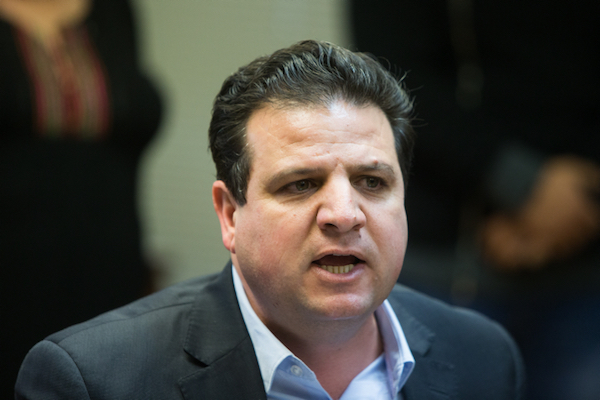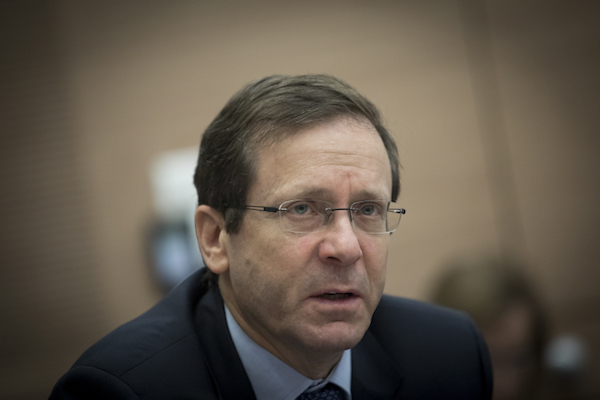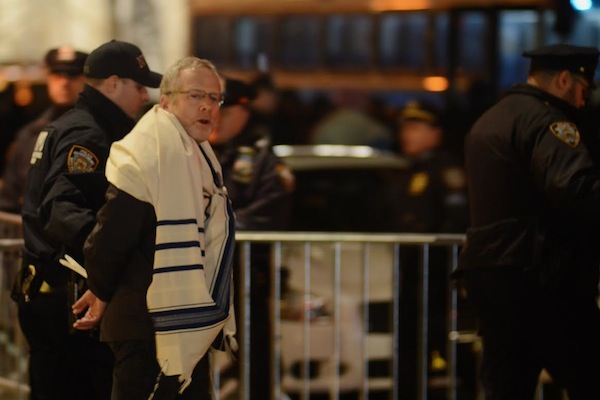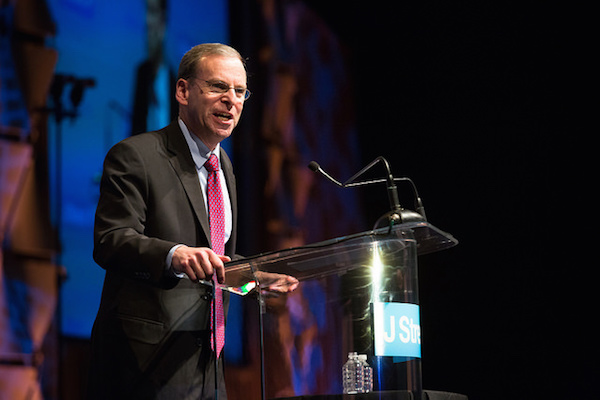Progressive American Jews may be willing to stand alongside American Muslims, but are they ready to demonstrate the same solidarity for Arab citizens of Israel? Ayman Odeh, the head of the Joint List, is a test case for where ‘pro-peace’ Jews draw the line.

Progressive American Jews have had a hard time in recent years finding an Israeli political movement they can truly stand behind. As long as there was a peace process, it was fairly easy for a “pro-peace” supporter to know whom to back. Without a peace process, without even the prospect of a peace process, the main metric through which many American Jews understand Israeli politics has all but collapsed.
The Labor Party, the party of Yitzhak Rabin and Shimon Peres, was traditionally thought of as the foundation of Israel’s peace camp. Under the leadership of Isaac Herzog — although beginning with Ehud Barak — Labor has made a concerted effort to disassociate itself from the Left. Herzog regularly argues that he is in fact a member of Israel’s “nationalist camp,” and even rebranded his party as the Zionist Union.
Herzog’s process of moving away from whatever remains of Israel’s peace camp culminated, perhaps ironically, with the publication of his very own peace plan last week. In an attempt to ingratiate himself with a more “centrist” constituency, he included in his 10-point plan waiting at least 10 years before even attempting to restart peace talks. It was a slap in the face for anybody who sees the urgency of ending Israel’s 50-year-long undemocratic military regime over millions of Palestinians, and more fitting for the man he aims to replace: Benjamin Netanyahu.
Which begs the question, which Israeli politician best represents the values espoused by all those American Jews who believe the occupation must end? Could it be that the Israeli politician most closely aligned with progressive Jewish American values is a Palestinian?
Delivering a keynote address at the annual J Street conference in Washington this weekend, Ayman Odeh, leader of the third-largest bloc in Israel’s parliament, the Joint List, described a Jewish-Arab agenda to advance true and full equality, social justice, and peace.
I asked Odeh if, in the wake of Herzog’s plan to defer peacemaking, he believes there is a unique opportunity to present himself to progressive American Jews as the Israeli politician who is most closely aligned with their values.

“I think I share something, as a member of the Arab minority in Israel, with American Jews, who are also a minority,” Odeh explained. “Especially right now, with this recent wave of anti-Semitism, I think American Jews can understand and identify with the some of the issues and experiences of the Arab minority in Israel.”
More than half of American Jews say working for justice and equality is an essential part of what being Jewish means to them, according to a Pew poll published last year. In the past, those values of justice and equality were very much intertwined with the civil rights movement, various refugee crises, and a broad range of social justice issues at home and abroad.
The first month of the Donald Trump presidency has thrown that progressive value set back into action: first against aggressive anti-migrant, anti-refugee and anti-Muslim policies; then against a frightening spike in anti-Semitic hate crimes; and worrying anti-intellectual and anti-press sentiments fueled by Trump’s brand of populist nationalism.
Noting what he described as the dangerous rise of Trump and his politics, Odeh added, “we have also seen mass mobilizations of Americans taking to the streets to oppose his racist agenda. I’m especially moved by the Muslim-Jewish solidarity I’ve seen, with Muslims raising money to repair Jewish cemeteries, with Jewish organizations fighting the Muslim ban. It’s that spirit of solidarity that will also help us advance our issues and our values.”

But while progressive American Jews may be willing to stand alongside American Muslims, are they ready to demonstrate the same solidarity for Arab citizens of Israel? Are they ready to partner with a Palestinian Israeli leader like Odeh to fight for the set of values they both hold?
It is probably safe to say that the affinity and attachment most Jewish Americans feel toward the State of Israel is in no small part based on a shared Jewish identity. The foundations of that connection can range the full spectrum from vehemently secular to messianic, but the common denominator remains the same — some form of common Jewish identity.
My colleague Dahlia Scheindlin put the question to J Street founder and president Jeremy Ben Ami on the sidelines of the conference on Monday. Considering the current Israeli government’s hostility toward Palestinian statehood, pluralism and true equality for all of its citizens, could Odeh and Palestinian citizens of Israel be more natural partners for J Street’s agenda?
“The most important value for J Street, which is an issue for the Palestinian community, is our Zionism,” Ben-Ami said. (You can read the full interview here.) “J Street’s raison d’etre in the Jewish community is to say — for those American Jews who care about there being a nation-state for the Jewish people — that things are going in the wrong direction.”

“So since we start from there, the work that we do and the messaging that we use and the advocacy that we do is going to be different from that of people who are looking for civil and equal rights,” the J Street president continued. “And while we believe firmly in those rights, we start in a different place. That makes the dialogue difficult. Our audience in the American Jewish community and on Capitol Hill doesn’t start in the same place as Ayman Odeh’s constituency.”
Surely there must be some opportunity, Dahlia suggested
“It’s not our natural alliance,” Ben-Ami insisted. “The natural alliance is, hopefully, with the folks in the center of the [Israeli] political map who understand the imperative of separating and creating two states and ending the occupation.”
Odeh, of course, understands the imperative of ending the occupation and creating two states. He said as much in his keynote address at the same conference just a couple of days earlier. He also posited, or perhaps bemoaned: “Palestinian citizens of Israel, alone, do not have the power to bring about this future of democracy, equality, and peace. But no one can achieve democracy, equality, and peace without us.”

